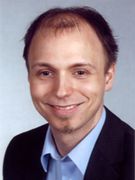Talk "Datagram Transport Layer Security", Friday, 13.05.2011, Room London, 5 - 6 p.m: Transport Layer Security (TLS, RFC 5246) can be used to secure application data by adding an additional layer between the transport and the application protocol. a modification of TLS for unreliable transport protocols has been introduced, called Datagram Transport Layer Security (DTLS, RFC 4347). We will give an introduction to the DTLS protocol design including the differences to TLS. To Robins Talk
Backstage with Robin
Robin, you're a working group member at IETF (Internet Engineering Task Force). Are there jolly quarrels going on with the people over there at W3C (World Wide Web Consortium)?
Not really, I'd say, at least not in the working groups I was part of (Transport Area and TLS). We're moving on lower layers than W3C, so we have not that much in common.
Do you have a different view on the internet than other people, since you're familiar with its protocol level?
I definitely see much more than web and mail, because they're just services like others. And you'll encrypt everything you're doing, because you know how easily it can be captured.
Apart from SCTP, OpenSSL and the whole Tekkiverse - which part of life do you find really fascinating?
Definitely travelling. It's exciting to see foreign cities and countries.
You're working as a research assistant at the faculty for electrical engineering and computer science of Münster University of Applied Sciences. What does a typical "Robin-day" look like?
Actually there is no typical day, it depends on the projects. Most of the time I'm doing research and all, that comes along with it: Implementing new features or algorithms, measuring with simulations and test environments, then writing papers about it. Occasionally I'm writing bugfixes for the DTLS implementation of OpenSSL, when bugreports appear on the mailinglists.
Why did you choose to present a talk at LinuxTag 2011?
I hope to draw people's attention to DTLS, so they use it more widely.
Robins Data Sheet
Place of birth: Oelde
Place of living: Münster
Age:28
Favourite programming language(s): C and Objective-C
Favourite FOSS operating system flavour(s): FreeBSD
A day is perfect for me, if ...
... a problem has been solved.
It really annoys me, when ...
... a bug was fixed after hours and hours of trouble shooting, only to stumble upon the next bug.
FOSS and Linux in 3 sentences:
Software and operating systems, which source code is available for everyone. Hence, everyone can correct and extend it, and the result is again available for everyone. Because of this, no one depends on vendors, but can handle problems himself - without paying expensive licence fees.

